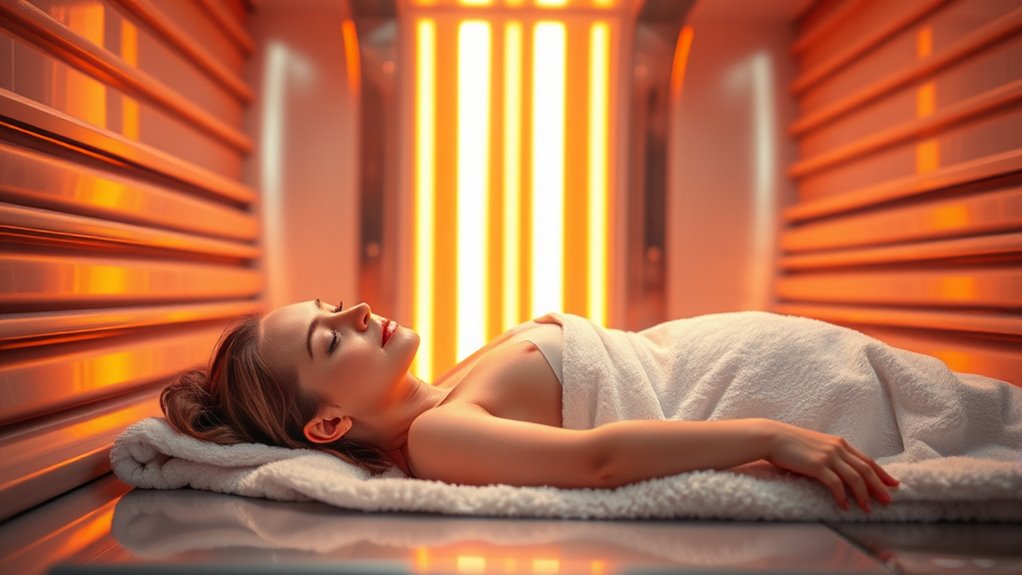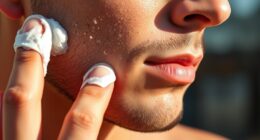Tanning can temporarily boost your mood by triggering endorphin release and promoting neurochemical changes that help you feel happier and less stressed. It may serve as a quick way to manage anxiety or depression, but it also comes with health risks like skin damage and cancer. Understanding how UV exposure affects your body’s chemistry and circadian rhythms can offer healthier ways to support your mental wellness—if you continue exploring, you’ll find ways to balance mood and health effectively.
Key Takeaways
- UV exposure stimulates endorphin release, which can elevate mood and reduce feelings of stress or anxiety.
- Tanning may temporarily improve emotional well-being by activating reward centers in the brain.
- Regular UV light exposure supports serotonin production, contributing to better mood regulation.
- Tanning can serve as a coping mechanism for negative emotions, offering short-term emotional relief.
- Outdoor activities combined with natural sunlight promote mental health without associated skin cancer risks.
How Tanning Enhances Mood and Emotional Well-Being

Tanning can directly boost your mood and emotional well-being by triggering physiological and psychological responses. After indoor tanning sessions, you often feel less upset, scared, irritable, nervous, jittery, and afraid. At the same time, positive feelings like interest tend to increase. These changes are supported by thorough psychiatric assessments, not just self-reports, confirming the real impact on your mood. The ultraviolet (UV) radiation from tanning stimulates the production of beta-endorphins, natural chemicals that reduce pain and elevate your mood. This biochemical response can promote relaxation and well-being, making you feel better after each session. Your mood improvements may also depend on your mental health profile, with some individuals experiencing more pronounced effects than others. Additionally, engaging in enjoyable activities like tanning can contribute to positive lifestyle habits that support overall emotional health. Incorporating healthy routines can further enhance the emotional benefits associated with tanning. Moreover, the endorphin response from UV exposure is similar to that produced during other pleasurable activities, reinforcing its mood-enhancing effects.
Tanning as a Coping Mechanism for Anxiety and Depression

Many individuals turn to indoor tanning as a way to manage feelings of anxiety and depression, seeking quick relief from negative emotions. For some men, frequent tanning is linked to heightened anxiety symptoms, possibly because it offers a temporary mood boost. People may use tanning as a coping strategy to reduce negative emotions and feel better, even if the effects are short-lived. Additionally, the high refresh rates of certain tanning devices can provide a sense of instant gratification, reinforcing usage. The psychological effects of tanning can create a sense of control or normalcy during stressful times. Moreover, some individuals may develop a dependence on tanning, which can lead to a cycle of shame and compulsive behavior. This dependence can sometimes evolve into tanorexia, a condition characterized by obsessive tanning behaviors. However, relying heavily on tanning can create dependency, leading to mental health issues like tanorexia and emotional burnout. Cultural and societal pressures also play a role, encouraging tanning to boost self-esteem or conform to beauty standards. While it might seem helpful initially, using tanning as an emotional crutch can delay seeking professional help and worsen long-term mental health.
The Role of Endorphins and Neurochemicals in Mood Improvement

Exposure to UV light triggers the release of endorphins, the body’s natural chemicals that boost mood and alleviate pain. When you spend time in the sun or under a tanning lamp, your brain responds by releasing these feel-good chemicals, leading to feelings of happiness and reduced stress. This endorphin surge often creates a euphoric sensation, making tanning an appealing activity. The release of beta-endorphins not only enhances your mood but can also foster addictive behavior, as your brain associates UV exposure with positive reinforcement. UV light activates brain regions linked to reward processing, reinforcing the habit. This neurochemical response explains why you might prefer tanning repeatedly, as the endorphin-driven mood boost becomes a compelling reason to seek out more UV exposure despite potential health risks. Regular exposure may also influence collagen production, contributing to skin elasticity and texture. Additionally, this process can influence neurochemical balance, impacting overall mental health and emotional well-being. Moreover, UV-induced endorphin release can lead to long-term mood improvements, making it a psychologically reinforcing activity. Interestingly, some studies suggest that UV exposure can also stimulate the production of serotonin, further enhancing mood and well-being.
Vitamin D Synthesis and Its Impact on Mental Health

Vitamin D plays an essential role in supporting mental health by acting as a neuroprotective agent that influences brain function beyond just maintaining bone strength. It reduces neuroinflammation, which is linked to mental health disorders like depression and anxiety. Vitamin D also supports the synthesis of serotonin, a neurotransmitter critical for mood regulation. It enhances brain plasticity, helping the brain adapt and recover from mental health challenges. Deficiency in vitamin D has been associated with increased risks of depression, anxiety, and other mood disorders. Additionally, vitamin D modulates neurotrophic factors like BDNF and NGF, fundamental for neuron growth and hippocampal health. Maintaining adequate vitamin D levels can improve emotional well-being and potentially reduce the severity of mental health symptoms. Moreover, emerging research suggests that vitamin D may influence neurotransmitter production and overall neural communication, further underscoring its importance for mental health. Recent studies also highlight the role of vitamin D in supporting brain immune responses, which can impact mental health outcomes.
Regulating Circadian Rhythms Through UV Exposure

Ultraviolet (UV) radiation from sunlight serves as a crucial environmental cue, or zeitgeber, that helps synchronize your internal circadian clocks with the natural day-night cycle. UV light influences both your central clock in the brain and peripheral clocks in skin cells, regulating biological processes tied to daily rhythms. Exposure to UVB can modify circadian gene expression in skin, impacting skin health and repair cycles. UV-induced circadian disruptions can also affect melatonin production, a hormone that protects against UV damage and maintains sleep-wake cycles. By aligning your exposure to natural sunlight, including UV, you support the proper functioning of your circadian system, which can enhance mood, improve sleep quality, and promote overall mental well-being. This natural regulation underscores the importance of balanced UV exposure for mental health. Additionally, understanding the role of circadian rhythms in overall health highlights how UV exposure can influence various physiological functions beyond mood, such as immune response and metabolic processes. For example, the weight of wind turbine blades can vary significantly, affecting transportation and installation logistics, which in turn can influence the deployment of renewable energy solutions that support sustainable living and mental well-being. Maintaining appropriate UV exposure levels can therefore be a vital part of supporting your biological clock and overall health. Moreover, UV exposure can stimulate vitamin D production, which is linked to mood regulation and immune function, further emphasizing its significance for mental health.
Risks and Limitations of Using Tanning for Mood Support

While UV exposure can help regulate your circadian rhythms and boost mood temporarily, relying on tanning as a mental health strategy carries significant risks. Frequent indoor tanning is linked with psychiatric and addictive symptoms, including signs of tanning dependence. If you have underlying anxiety or mood disorders, you might experience stronger mood improvements, but this can mask deeper issues. Many continue tanning despite skin damage or increased cancer risk, using it as self-medication. Tanning provides only short-lived mood boosts that can reinforce dependence, not sustainable mental health. It’s also ineffective for treating conditions like Seasonal Affective Disorder and can delay proper care. Additionally, addiction potential makes tanning an unreliable and unsafe coping mechanism. The risks—skin cancer, premature aging, addiction—far outweigh any temporary emotional benefits. Engaging in outdoor activities like hiking or camping can provide natural mood boosts without the health risks associated with tanning. Furthermore, increasing awareness about the cybersecurity vulnerabilities related to online health resources can help individuals seek safer, evidence-based treatments for mood and mental health issues. A better understanding of psychological dependence can also aid in developing healthier coping strategies.
Emerging Insights on Physical Health and Mental Wellness Connections

Emerging research highlights a strong, interconnected relationship between physical health and mental wellness, showing that improving one often benefits the other. When you engage in regular physical activity, you’ll notice mood boosts and stress reduction, which can help prevent mental health issues. Exercise also improves sleep quality and enhances self-esteem, contributing to better mental well-being. The connection runs both ways: poor mental health can lead to physical problems like heart disease or diabetes, while good physical health supports mental resilience. Physical activity influences brain chemistry through neurotransmitters and hormonal regulation, supporting cognitive function and mood. Lifestyle choices, such as staying active and maintaining social connections, further mediate this link. Additionally, engaging in positive social interactions can amplify these mental health benefits by fostering a sense of community and belonging. Recognizing these connections encourages holistic approaches to health that benefit both your body and mind. Furthermore, understanding the bi-directional relationship between physical and mental health underscores the importance of integrated wellness strategies. It is also important to consider that nutritional habits can significantly impact mental health, highlighting the need for balanced diets alongside physical activity.
Frequently Asked Questions
Can Tanning Help Treat Seasonal Affective Disorder (SAD)?
You might wonder if tanning can treat SAD, but it’s not effective. Tanning beds emit harmful UV rays that don’t influence mood or circadian rhythms like natural or artificial light therapy does. Instead, they increase skin cancer risk without relieving symptoms. For better mental health, stick to proven methods like bright visible light therapy, outdoor activities, or vitamin D supplements, rather than risking skin damage from tanning.
How Does Tanning Compare to Light Therapy for Mood Improvement?
When comparing tanning to light therapy for mood improvement, light therapy is more effective because it directly stimulates brain areas that regulate mood through bright light exposure. Tanning mainly affects the skin and doesn’t activate the pathways needed for mood benefits. While some short-term mood boosts happen with tanning, they aren’t reliable or long-lasting, and tanning carries significant health risks, making light therapy the safer, better option.
Is Tanning Addiction a Recognized Mental Health Concern?
Imagine your brain craving a golden glow so badly it’s like an addiction to sunshine itself. Yes, tanning addiction is increasingly recognized as a mental health concern. Researchers see it as a compulsive behavior linked to psychiatric issues like OCD and body dysmorphic disorder. Though not officially classified, mental health professionals treat it as a behavioral addiction, highlighting its seriousness and the need for awareness and intervention.
What Are the Long-Term Psychological Effects of Frequent Tanning?
Frequent tanning can lead to long-term psychological effects that disrupt your mental health. You might experience chronic anxiety and depression as a result of obsessively pursuing a perfect tan. This behavior can distort your body image and diminish your self-esteem. Over time, it may interfere with your daily life and relationships, making it harder to seek help. The cycle of dependence can overshadow other important aspects of your well-being, worsening your overall mental health.
Are There Safe Alternatives to Tanning for Enhancing Mood?
You’re wondering if there’s a safe way to boost your mood without risking skin damage, right? Luckily, there are options like self-tanning lotions, sprays, and bronzing drops that give you that sun-kissed glow—no UV rays required. Plus, enjoying sunlight through light therapy or simply staying active outdoors can lift your spirits without the harmful effects. Who knew that looking good and feeling good could be so safe and easy?
Conclusion
While tanning might boost your mood and help manage stress, don’t forget it’s no substitute for proper medicine or a good scroll through your favorite book. Think of it like a modern-day elixir—use it wisely and in moderation. Remember, even the wise Socrates knew balance was key. So, enjoy the sunshine safely, and keep your mental health on a sturdy ship, sailing smoothly through life’s storms.









